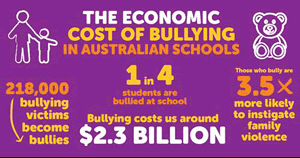 Her name is Rebecca, she is the parent of Joanne 16 and she is seeking my help as a child and adolescent psychologist because she is frankly terrified of her teenage daughter, she says “… She scares me.” Jo has missed 24 days of school so far and it is only Term 2 and just seems to vanish for days at a time. She’s smoking cannabis and has recently been arrested for shoplifting. Tensions quickly escalate when she does return to the family home.
Her name is Rebecca, she is the parent of Joanne 16 and she is seeking my help as a child and adolescent psychologist because she is frankly terrified of her teenage daughter, she says “… She scares me.” Jo has missed 24 days of school so far and it is only Term 2 and just seems to vanish for days at a time. She’s smoking cannabis and has recently been arrested for shoplifting. Tensions quickly escalate when she does return to the family home.
She lost her iPhone recently and Rebecca recounts how she just started yelling at her to buy her a new one. It couldn’t just be any phone. It had to be the newest, most expensive iPhone. Her mother told Jo that the phone was her responsibility, which ignited a torrent of abuse, and the complete trashing of her bedroom, accompanied by threats to kill herself and to destroy the house.
Rebecca ended up calling the police, who managed to calm her down. But Rebecca is one of a growing number of parents under siege from their teenagers, a growing number of whom are smashing windows, doors and walls have holes in them, furious they’re asked to stop playing computer games, while some are holding knives to their parents’ throats, or threatening to kill them.
Jo’s behaviour and many like her, is the direct result of the creation of a culture of indulgence and entitlement, which some psychologists argue is the defining characteristic of this generation of children. It’s the end result of some parents’ desire to deliver the perfect childhood giving their offspring everything they want, when they want it. In doing so, Rebecca and many parents like her, end up emotionally and materially pampering their children. Boundaries are rarely set, let alone enforced and consequences aren’t consistently imposed by parents who want to be their child’s best friend. Some teenagers like Jo grow up expecting attention and success and become so accustomed to getting what she wants that she doesn’t know how to cope when she is stymied.
Smaller families and time poor parents mean larger number of parents are electing to take the path of least resistance, when it comes to disciplining their teenagers. Rebecca progressively asked less and less of Jo, not delegating because it’s easier and quicker to do herself.
No parent likes seeing their child upset but many psychologists believe we’re going overboard in our quest to please our kids. Many schools report that kids are now so conditioned to receiving a ribbon just for showing up at the sports carnival that they overreact when things don’t go their way. Schools are very quick to gratify our students, the notion of associating effort with outcome is an anathema to many students. Because Rebecca can give Jo so much, she now sees it as her right rather than a privilege – the idea that with rights come responsibilities seems to have been lost in the mists of time.
Jo has grown up shielded from difficulty and disappointment and she is likely to struggle in adulthood if she doesn’t get into her first preference for university, misses out on a job, or is dumped by the love of her life. Because she hasn’t really developed resilience, she emerges a lot weaker from tough experiences, which predicts the mental health issues which are now being observed in 1 in 4 students.
But none of this should be a surprise, a 2005 study undertaken by the Australian Childhood Foundation, 38 per cent of Australian parents surveyed said that parenting didn’t come naturally to them, and 63 per cent were “concerned” about their level of confidence as parents. Asked what strategies they used to teach children the difference between right and wrong, 98 per cent thought it was about making children feel loved, spending time with them, and setting a good example; 82 per cent favoured rewarding good behaviour; and 78 per cent said they reasoned with their children. All are admirable practices, but such an approach is unlikely to be effective unless it is backed by firm discipline (which only half of the surveyed parents employed).
Why has there been such a decline in parental confidence? Why is Rebecca frightened to set any kind of rules, limits or boundaries for Jo? Perhaps the answer lies in the promotion of parenting approaches such as permissive parenting, advocated by US paediatrician Dr Benjamin Spock in the 1950s and 1960s as a reaction against the authoritarian child-rearing practices of the past. The self-confessed insecurity of parents and their hunger for guidance indicate that these tactics simply have not worked. Many parents in the 21st century seem to be living in a vacuum of quiet desperation. The problems in schools, as hapless teachers try to discipline kids whose parents can’t (or won’t) control them, and the pressures on doctors to prescribe drugs to regulate these children’s objectionable behaviours are symptoms of the problem.
Parent education has always been a struggle for schools, as the same parents always turn up to the talks and the ones that the school reckons need to be there never front up. The good news is that finally there is some hope for bewildered parents and frustrated schools.
SchoolTV represents the first move into content distribution using a platform developed by Australian digital practice, OnDigital, which gives schools an unprecedented opportunity to provide real-time, standardised health and wellbeing information directly to parents in their natural environment using their smartphones.
SchoolTV is a unique concept designed to provide parents with the skills, knowledge and strategies to deal with the high prevalence problems that so many confront in bringing up their children.
OnDigital has developed a highly successful digital platform that has been adopted by many of the country’s leading independent schools. Within this platform is the ‘School App’ – a mobile platform designed to provide daily access to important information such as contacts, news, sporting fixtures, alerts and more.
The average penetration of the School App is 83% and this presents an exceptional opportunity to engage users with a broad array of content. In 2014, OnDigital began discussing with schools the opportunity and value of providing content into the school platform, leveraging the website, school app and newsletter.
The response was extremely positive and this led to the concept of SchoolTV. The format of SchoolTV is the provision of fresh, engaging, easy-to-digest content. I am delighted to be involved, by providing up-to-date content, alongside interviews with experts, parents, students as well as tips, helpful advice, smartphone apps and evidence web-based programs on specific topics.
This is a world first online channel for schools and parents to connect, inform and empower on the big issues facing the successful rearing of healthy, well and resilient young Australians. If you are interested, go to www.schooltv.me for more information.


